West Hartford Putting Pilot Food Waste Collection Program to Bid

Audio By Carbonatix
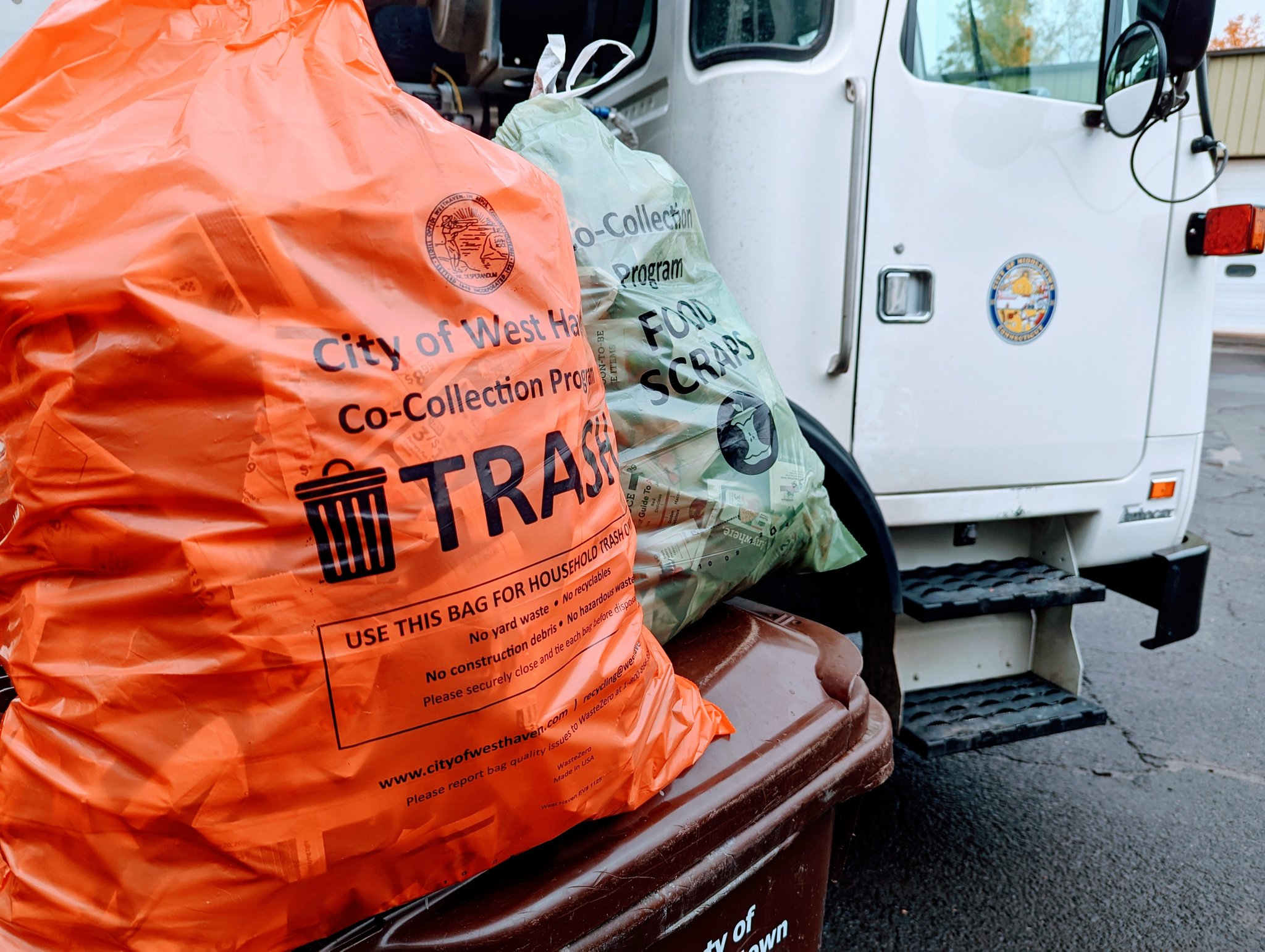
Special bags, like this being used in West Haven, will be distributed to West Hartford residents in the pilot program. Courtesy of DEEP (we-ha.com file photo)
The Town West Hartford has been chosen as one of 15 recipients in the Connecticut Department of Energy and Environmental Protections’s Sustainable Materials Management Grant program and has identified a neighborhood where a pilot program will be implemented.
By Ronni Newton
A pilot program that the Town of West Hartford will be launching early next year, intended to develop data about the impact that diverting food waste can have on reducing the total amount of household waste, will be put out to bid, Town Manager Rick Ledwith told a meeting of the Town Council’s Public Works, Facilities, and Sustainability Committee on Thursday morning.
“This is a very important topic to our community,” Ledwith said, and a topic that has generated a lot of interest. He said he has received more than 100 emails about it, not just from those who live in the neighborhood of 700 homes chosen for the pilot program, but also from existing customers of Blue Earth Compost, which has an existing paid subscription service for food waste collection to which several hundred residents throughout town subscribe.
The town’s receipt of a grant through the Connecticut Department of Energy and Environmental Protection’s (DEEP) Sustainable Materials Management (SMS) program to fund the pilot program was announced last month, and it’s something that Director of Public Works John Phillips had been anticipating for a long time. So long, in fact, that when the town competitively bid its trash and recycling collection program in 2017, “written into the contract was a provision that we may implement a pilot for the separate collection of food waste,” Ledwith said.
Paine’s Inc. was selected in the last competitive bid process as the town’s contractor for collection of trash and recycling, and remains under contract with the town. When West Hartford was awarded the DEEP grant, the initial plan was to utilize Paine’s since the provision was already in their contract.
“Our current vendor has been a true partner,” Ledwith said, but ultimately the town made the decision to bid just the food scrap collection portion of the pilot program.
“While not required, the town has made a decision to put the program out to bid,” Ledwith told We-Ha.com on Thursday following the meeting.
“We are really excited to see this kind of interest because to us that means the community is ready for this,” he added.
The bid process will begin in the next two to three weeks, Director of Finance Peter Privitera told the committee. Town staff will be involved in reviewing, interviewing, and then ranking the bids based on a set of objective criteria before making a recommendation for a vendor to the town manager.
The only portion of the pilot program that is being put out to bid is the food scrap collection, Phillips clarified. “We are not putting out the trash collection portion,” he said, and that will continue to remain with Paine’s no matter which company is selected for the food scrap collection.
The pilot in West Hartford will be funded by a grant of $106,200. The town is one of 15 municipalities and three regional groups in Connecticut to receive a funding for a pilot, and in West Hartford the pilot will be for food scrap collection as well as the impact of unit-based pricing on increasing waste diversion as recommended by the statewide Connecticut Coalition for Sustainable Materials Management (CCSMM).
The pilot program will run for nine months, and will likely begin in April. Phillips said he doesn’t want to begin the program in the winter, and wants to have the opportunity to have everything in place – including special bags and food scrap containers – and time to educate the households that will be involved.
A neighborhood near Morley Elementary School with a grid pattern has been chosen for the pilot. All homes in the area bounded by Trout Brook Drive to the west, North Quaker Lane to the east, Fern Street to the south, and Asylum Avenue to the north, will be included in the pilot. Phillips said the town wanted roughly 700 residences in the pilot program, and the total number of homes in this area totals 690.
“It’s a well-connected community,” Phillips said previously, which is also valuable to the pilot as neighbors will share their opinions – favorable as well as unfavorable – with each other, and that type of feedback is important.
The $106,200 grant will fund the logistics, education, 30-gallon orange bags to be used for trash, and green bags and a five-gallon pail to be used for food scrap collection. Any overage in cost that results will come from the Public Works operating budget, Phillips said.
Those involved with the pilot program will still put their trash out weekly in their green (or pink) bins, but will need to first put the trash into one of the 30-gallon orange bags they will be issued. The trash will be collected by Paine’s as usual. The bi-weekly recycling collection will not change.
Also each week, however, those involved in the pilot will be asked to put their food waste, which they will have been placing in the green bags they have been issued, at the curb in the 5-gallon bucket they will also be issued. Those pails will have a locking top.
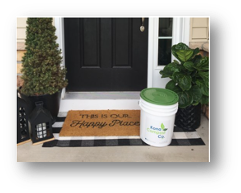
Image of food waste pail. Courtesy of John Phillips
Mayor Shari Cantor asked during the committee meeting if the food waste will be likely to attract wildlife, and Phillips said there should not be any impact or greater attraction to bears or other animals since it’s not new waste, but rather waste that is already being put out at the curb. “There is no increased risk … we’re just putting it in another bucket,” Phillips said.
After collection, under the conditions of the grant, the food scraps will be brought to Quantum Biopower in Southington where the material will be turned into energy and compost.
The goal will be for each household to use just one 30-gallon bag – roughly the equivalent of two kitchen trash bags – for the remaining trash per week. The number of bags actually used will be an indicator of the impact that diverting food waste will have.
The pilot is expected to produce data indicating up to a 40% reduction in waste.
“It’s time to go forward,” Phillips said.
Food waste diversion has been implemented in six of West Hartford’s public schools, with Morley most recently brought online. Roughly 4.66 tons of food waste has already been diverted from the trash stream this year.
In a PowerPoint presentation shared with the committee, Phillips outlined the waste management crisis – the rapidly shrinking capacity for waste disposal in the state and the region – that is already underway.
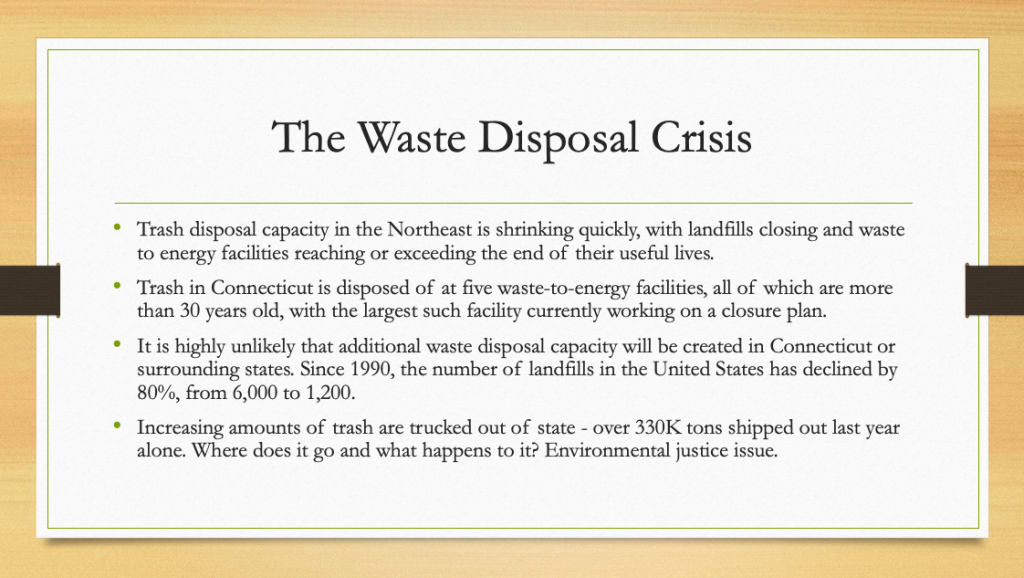
Courtesy of John Phillips
Annually West Hartford disposes of just over 18,000 tons of MSW (trash), Phillips said. Currently, under the terms of the town’s contract with Paine’s, the disposal cost is $96 per ton, and under the terms of the current contract will increase to $98 for FY24, which begins on June 30, 2023.
If the total volume of trash is not decreases those tipping fees, which are likely to reach at least $120 or $130 per ton when the town goes out to bid for a new contract for FY25, will be applied to that total, Phillips said. Organics represent roughly 67% of the total volume of MSW, and diverting as much as possible will become even more critically important as the cost increases.

Courtesy of John Phillips
The town’s recycling rate was 33.5% in 2021, which Phillips said is decent, “but not nearly enough.”
Phillips said that according to the Environmental Protection Agency, “42% of all greenhouse gasses are related to materials management decisions. These are the things we are talking about.”
The town’s yard waste collection program is already popular, and the food scrap diversion at schools is also having an impact. Further improving recycling, composting, and materials reuse will help the town substantially reduce greenhouse gas emissions.
“We’ve been trying to move this way for a long time,” Phillips told the committee. A pay-as-you-throw program was seriously discussed in 2016, and subsequently, but shelved due to significant resistance from the community.
“I think the crisis is real and I think Connecticut is in a very difficult position,” Phillips said. “I am concerned about the cost and our very valuable tax dollars having to go toward end of life waste programs when they’re more needed for education, public safety, and public works infrastructure,” he said.
Unit-based pricing and food waste diversion have to work together, and Phillips said he while it’s going to be a challenge, and a difficult ask, he just doesn’t see any other viable options.
He said he is confident the pilot will be a success. If the decision is then made to move to a town-wide program, that would be part of the budget for FY25.
Ledwith noted that the upcoming RFP for food scrap collection is just for the pilot period. “We will have to go out to bid again once we are beyond the pilot program,” he said.
Like what you see here? Click here to subscribe to We-Ha’s newsletter so you’ll always be in the know about what’s happening in West Hartford! Click the blue button below to become a supporter of We-Ha.com and our efforts to continue producing quality journalism.


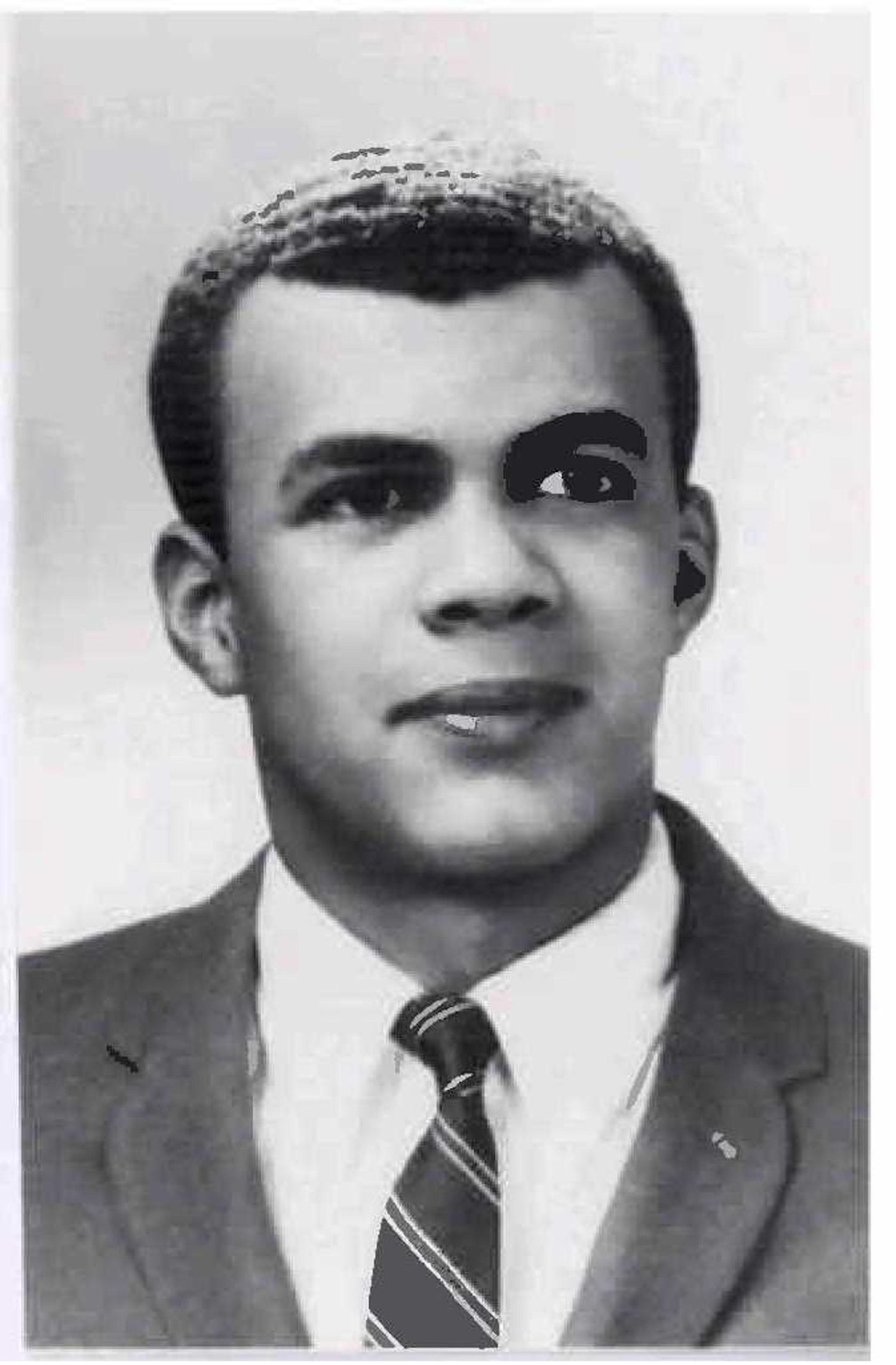
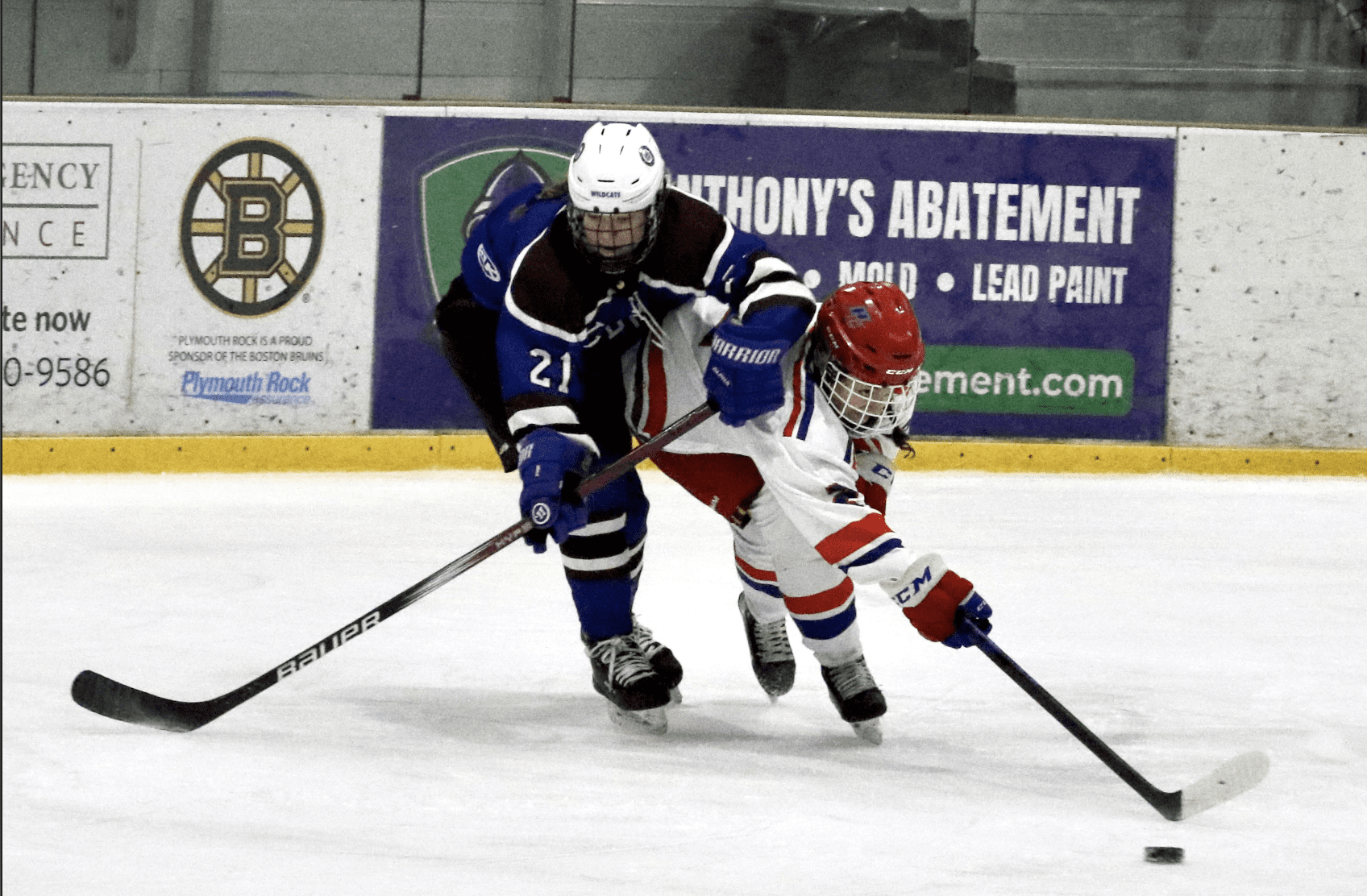
Bravo to the town for considering other vendors such as Blue Earth Compost. So many people in the pilot neighborhood and around our town use Blue Earth and pay out of our own pockets.
I was extremely pleased in the prompt response that I got via email from the Mayor, TM, and Councilor Sweeney.